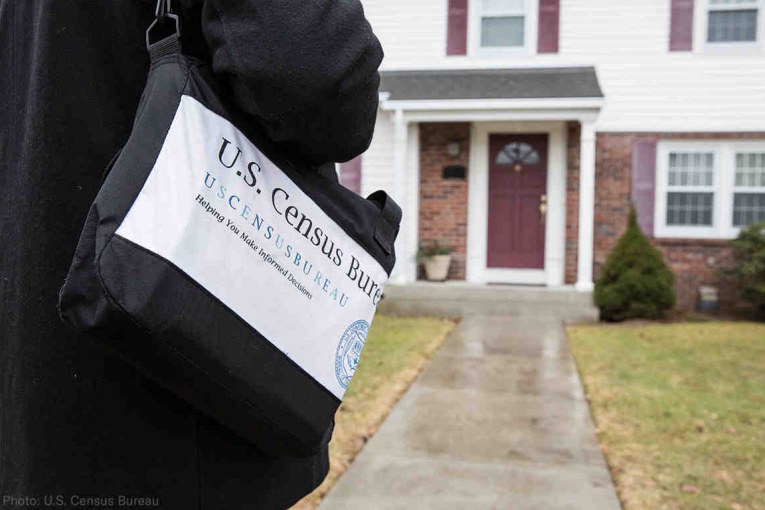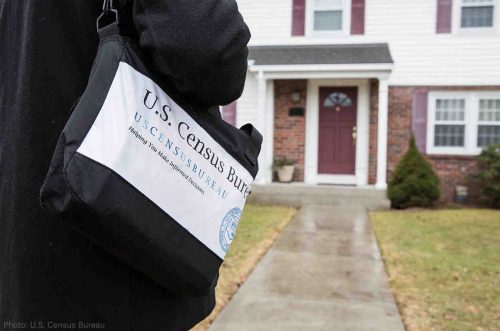
 By Davin Rosborough
By Davin Rosborough
On Monday night, Secretary of Commerce Wilbur Ross announced that he will ask about the citizenship of every person in the U.S. in the 2020 census. He is doing this at the request of the Justice Department, against the advice of the Census Bureau’s career professionals, civil rights groups, and communities across the country. He has admitted that adding this question was “controversial.”
The Constitution requires that the federal government conduct a census every 10 years. The Fourteenth Amendment mandates that the decennial census count the “whole number of persons in each State.” Yet adding the citizenship question threatens exactly this goal by intimidating citizens and non-citizens alike from participating in a process which directly affects their lives. This decision is just the latest in the Trump administration’s attacks on immigrant communities and other vulnerable populations. It puts politics over democratic principles and the consequences will be enormous.
Research from the Census Bureau just last year identified how the current political environment may intimidate individuals in already hard-to-count communities from responding to the decennial census. In fact, the research was prompted by a “recent increase in respondents spontaneously expressing concerns to researchers and field staff about confidentiality and data access relating to immigration.” Participants in focus groups specifically talked about Trump’s anti-immigrant policies like the Muslim ban and his ramp up of deportations as reasons they  would fear participating in the census. Driving down response rates in certain racial and ethnic groups not only threatens the integrity of census data, it harms those very communities.
would fear participating in the census. Driving down response rates in certain racial and ethnic groups not only threatens the integrity of census data, it harms those very communities.
The federal government depends on decennial census data to decide how many Congressional representatives each state receives and states rely on this data to draw the districts for their own legislatures. Adding a citizenship question and depressing response rates in already underrepresented communities will allow politicians to draw even more skewed legislative districts. It will also harm federal and state government efforts to accurately distribute funds to communities based on population in everything from Medicaid to school-lunch programs to veterans’ assistance. As Ross is well aware, the census has already struggled to accurately count the numbers of many non-white groups. Inserting this question threatens the progress made over the previous two censuses.
The political decision to add a citizenship question becomes even plainer when looking at the context for the Justice Department’s request. The Department of Commerce was required to submit to Congress the topics of its proposed questions last March in order to ensure the chance to provide input and test the wording of questions. Yet citizenship was not among the topics submitted to Congress and was rushed into consideration because of a late request from John Gore, the acting assistant attorney general in the civil rights division and a Trump political appointee.
Five former directors of the census, serving in both Republican and Democratic administrations, have opposed this decision. The Justice Department argued that citizenship data is critical to the enforcement of the Voting Rights Act, yet the decennial census has not included a citizenship question since 1950 (which the exception of New York and Puerto Rico in 1960). In fact, the Justice Department already has citizenship data available to it, which is collected through smaller population surveys that can be adjusted statistically to account for people who don’t respond. The critical difference is that the decennial census is an actual hard count of the population, and if someone doesn’t respond because they are intimidated, they simply go uncounted.
Democracy requires that the census count people in all communities, not just those whom the administration favors.
Davin Rosborough is a staff attorney with the ACLU Voting Rights Project.

It is seldom when I agree, in the main, with an ACLU spokesperson.
This is different. This is so un-American and stupid, I would advocate for radical civil disobedience, including everyone, citizen or not, to refuse to cooperate. I currently intend to shred any census form I get, and mail the shards to 1600 Pennsylvania Avenue, Washington DC.
If enough Californians would do this, where Nevada and Wyoming each appear to have more residents than CA, maybe we could force the Administration to do a “do-over”. The constitution calls for a complete census, irrespective of slave/free, voter/non-voter, citizen or immigrant (legal or illegal). “Person”.
This question is full of “mischief” as to how the results will be used and/or ‘spun’… and will have a chilling effect on participation by many… and to the extent CA is undercounted, that will cost us dearly in votes in Congress, and appropriations of federal money, even considering that CA sends far more money to DC than it receives in federal funding, today!
This is a large leap backwards in our history.
It is a leap “way” back to 2000 when the Census asked if you were a citizen.
I agree with Howard that it will probably result in less money and congressional representation for CA (not good for those of us that live in CA).
does anyone know if the ACLU was against the same question back in 2000 when Clinton was President?
Was this something the Clinton administration tried to do?
FACT CHECK: Has Citizenship Been A Standard Census Question?
Do you think NPR is working with Trump to spread “fake news”?
The 2000 long-form survey, sent to a subset of Americans, asked about citizenship. The more widely distributed census short form that year did not.
Census.gov/Screenshot by NPR
From the FACT CHECK link above:
The American Community Survey is an annual survey given by the Census Bureau to a select number of households.
American Community Survey questionaire, 2010
See page 8, question 8.
However the issue at hand is which questions to put on the 10-year census survey that all individuals are supposed to respond to.
The bigger problem is that the fear will cause immigrant populations to not fill out the census form
Or you’re not seeing the threat of non- participation
Non-participation keeps growing Most people I know have never sent in a census form (or jury notice form or draft registration form or even vote). A little less than half the people I know we’ll vote, but WAY less than half have ever filled out a census or jury form.
Sweeping conclusions based on anecdotal information (such as “most people I know”) are rarely valid. No survey study gets a 100% response. In fact, the overall response rate for the 2010 census was unchanged from the 2000 census—72%. To compute official statistics the Census Bureau uses various methods and mathematical models to compensate for missing data.
The problem with the Trump administration proposal is that it introduces a biasing factor that will have a disproportionate effect on already underrepresented communities. The cynical political motivation is quite apparent.
I’ll be happy to read any link Eric posts that shows the percentage of people voting, responding to jury duty or completing census forms is increasing (to save Eric time I’ll share that it is not just my friends but every study I have read in the last decade shows the overall trend of non-participation is increasing)…
Nice to see that the Vanguard is back to allowing pejoratives. Or maybe only those from politically correct liberal speak.
Seems like very good data to have except that it might end up politically inconvenient to certain political parties.